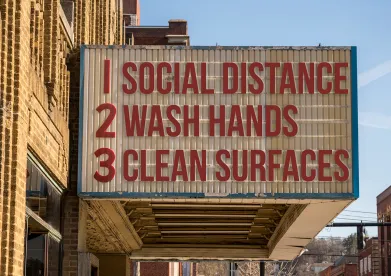Health and safety are rightly everyone’s first priority as COVID-19’s unprecedented impact continues to grow each day. But businesses should also start considering what future lawsuits they may face related to COVID-19 and how to protect their rights under third-party liability insurance policies intended to cover such lawsuits.
One key issue every business should consider promptly is whether liability insurers will insist on broad COVID-19-related exclusions at policy renewal and what impact such exclusions may have on coverage for any COVID-19-related claims that may be brought against the business after renewal.[1] Many liability policies limit coverage to “claims made” during the policy period. This is typically the case for policies covering professional or malpractice liability, directors and officers liability, errors and omissions, fiduciary liability, and employment practices liability. Many forms of general liability coverage (which insure property damage and bodily injury claims) are also written on a “claims made” basis. A broad exclusion for COVID-19-related claims would create significant concerns for a business purchasing “claims made” coverage if the business is not yet the subject of any COVID-19-related claims but may face such claims in the future. Businesses should be aware that in similar contexts—where the prior claims-made policy (without an exclusion) generally covers only claims “made” and noticed to the insurer before the policy expires, the newly purchased policy expressly excludes certain claims, and such claims are filed against the business during the new policy period—insurers often deny coverage under both the old and new policies.Policyholders in all lines of business, and especially those in fields such as healthcare, should anticipate that they may soon face this issue with respect to COVID-19-related claims.
Where this concern exists, one possible solution is the “notice of circumstance” provision found in most “claims made” policies. Under this provision, a policyholder can provide notice to its current policy of an anticipated potential claim and if such a claim later arises it will be treated as having been “made” when the “notice of circumstance” was provided, making coverage under that policy available even for a lawsuit filed after the policy expires. Although the requirements for a “notice of circumstance” vary, a common formulation allows a policyholder to provide notice of “any circumstances which may reasonably be expected to give rise to a Claim,” with the notice describing “the circumstances and the reasons for anticipating such a Claim, with full particulars as to the dates, persons and entities involved.” Chatz v. Nat’l Union Fire Ins. Co. of Pittsburgh, Pa., 372 B.R. 368, 370 (N.D. Ill. 2007). Such notice is capable of preserving coverage under an existing policy for lawsuits that may arise in the future but are traceable to the circumstances for which notice was given.
Whether providing a notice of circumstance of potential COVID-19-related claims might benefit a business will depend on the specific liability risks facing the business, the precise terms of its current liability policies, and the likelihood of broad COVID-19-related exclusions at renewal. Since the COVID-19 pandemic could result in significant litigation against any number of businesses over the coming months and years—whether by customers, creditors, employees, shareholders, or others—conducting a thorough analysis of these considerations is appropriate for many businesses. In doing so, businesses will want to work closely with an experienced insurance broker and coverage counsel who can evaluate these issues and, if necessary, draft an appropriate notice of circumstance that will satisfy the applicable policy’s particular requirements and effectively preserve coverage.[2] Although the option to provide a notice of circumstances is often overlooked by policyholders, it may be quite valuable for certain businesses in these extraordinary and uncertain times.
[1] While there have not yet been reports of insurers introducing broad COVID-19-related exclusions into liability policies, it is not uncommon for insurers to introduce broad exclusions in response to the arrival of new systemic risks. For instance, liability insurance policies of all kinds issued in recent decades often include a broad pollution exclusion, many of which exclude all claims “arising from or in any way related to” pollution.
[2] The Chatz case noted above provides a useful warning on the importance of properly drafting a notice of circumstance, as the court there found the policyholder’s notice that it was “contemplating the filing of a Chapter 11 bankruptcy petition and believe that such filing will give rise to claims being filed against the Company” was insufficient to satisfy the policy’s “notice of circumstance” provision. 372 B.R. at 370.



 />i
/>i

